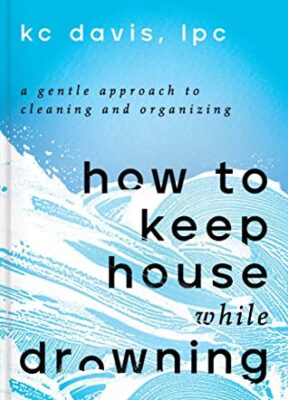
Hello and welcome back to me! I haven’t reviewed a book since March of 2021, so you know this book was really something if it finally got me back on here and posting. It isn’t enough to simply recommend to my IRL friends, I need to share the joy of it over CBR, too. I also bought a physical copy of my own to access whenever I need it.
A little understanding of me – I hate self help books. I’m thrilled they help so many people, but traditionally have not found much use for them myself. That said, I am also a person who struggles with a lot of things in my daily life. I’m a SAHM with a LOT of guilt about not doing enough. I never feel like I’ve “caught up” with anything and my house is never clean. I’m overwhelmed much of the time and the combination leaves me in a state of even more anxiety than I’m prone to naturally.
Enter Naura. I checked this book out of the library on my friend Naura’s recommendation. She is also a SAHM and said she thought of me while reading it. “While reading a self help book? About cleaning? Really?” I thought to myself. But she was so incredibly right. I loved that there was a “How to Read This Book” section to help guide neurodivergents through the content, but what really hooked me in was the introduction. I knew right away this was a person who understood the ways in which my life was hard and also the ways in which my brain was broken by trying to fix them. This book lays out a lot of options for solutions to common problems the brain goblins create when it comes to keeping up with what the author calls “care tasks.” This is everything you do to keep house, but with a better label. There are two concepts that really reworked my brain – that care tasks are morally neutral and that you don’t exist to serve your space, your space exists to serve you. This is wild to my perfectionist brain. Morally neutral? You mean I’m NOT a bad person when my floors aren’t vacuumed and my laundry isn’t done? Crazypants. Taking the moral judgement off of all of the care tasks I observe or feel responsible for in my household is already starting to do wonders for me. One of my failings in taking care of myself is that I tend to feel that rest is lazy and being productive is essential. This is all wrapped up in ascribing moral value to both the tasks and my personal completion of them (also capitalism, but that’s a bigger problem for another book). It is my *job* as the SAHM, as the person not bringing money, to take care of my house, to handle the bulk of the care tasks. But what this book reminds me is that I get to define what that means. If I can function and succeed with my care tasks in a state other people might not want to work with, then I’ve already done what I needed to do. I can let myself off the hook for having someone else’s ideal of a working household because, again, I don’t exist to serve my space, my space exists to serve me.
This book also helpfully outlines some actions you can take to help guide you through finding out what is important to you and how to accomplish it even when the brain goblins are winning that day. There are gentle ways to prioritize the care tasks in your home, ways to address an imbalance of the division of labor, and so much more. The “Five Things Tidying Method” is something I’m already using every single day to help me deal with the stress of having a messy house lorded over by a two year old. It gives better ways to talk to yourself about all of these things and reminds you that you need to be kind to yourself. It constantly reminds you that whatever you do to improve how things are working, it’s about what functions for you, NOT your value or worth. It’s short, it’s easy to get through, and it gives you easy ways to move through it to make it even easier/shorter if that’s what you need (I read the whole thing).
In other words, it was enough to get me to buy a copy and finally get back on here to write a review. I’m grateful to KC Davis for putting this together in a way that really spoke to me, and I hope it helps someone else out there, too.
